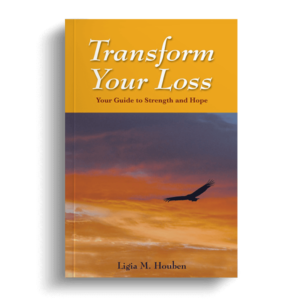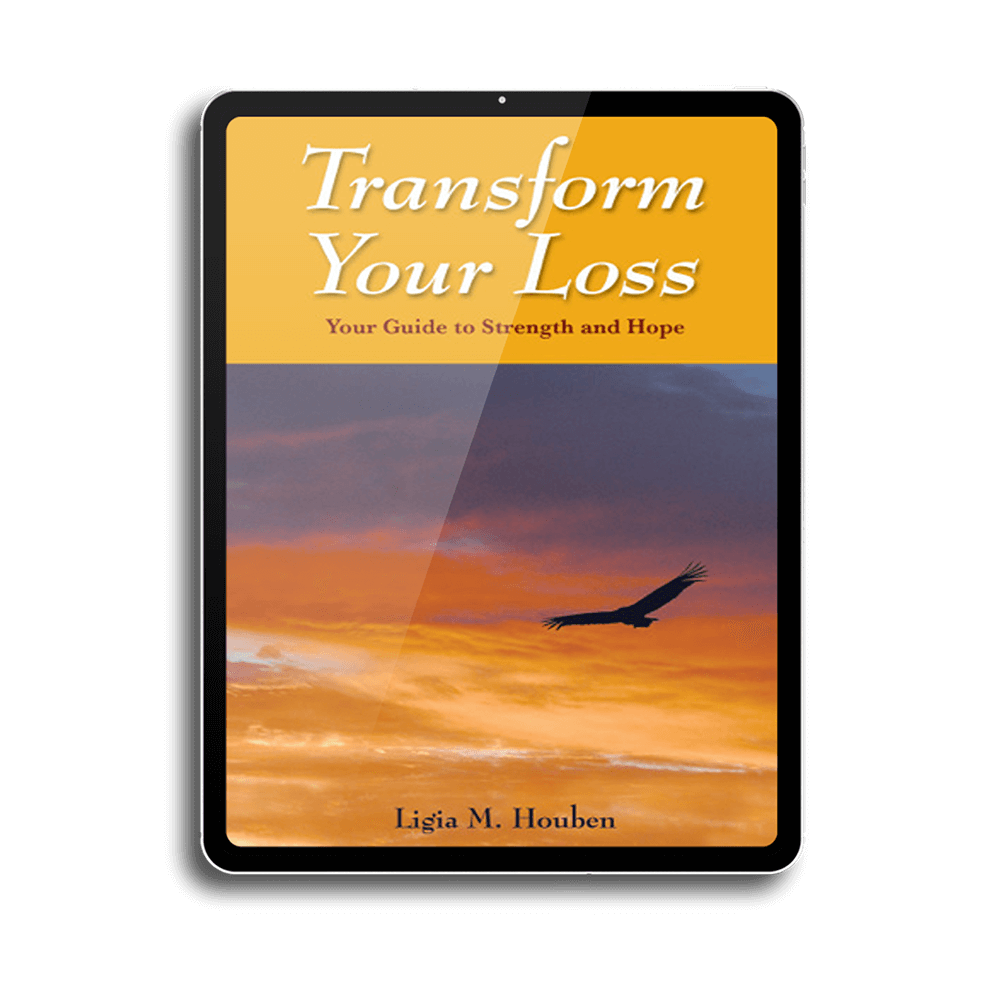
by Ligia Houben | Mar 19, 2024 | Blog US
Experiencing a crisis is an expected human experience. The question that arises is, how do we navigate a crisis not just by surviving but by thriving? It’s essential to delve deep into understanding what constitutes a crisis, its impact on us, and how we can emerge stronger.
What Defines a Crisis?
According to Merriam-Webster, a crisis is an emotionally significant event or a radical change of status in a person’s life, marking a period of instability or a crucial state of affairs where a decisive change is impending. Kendra Cherry adds a dimension by stating that in mental health terms, a crisis refers not to the traumatic event itself but to an individual’s reaction to it. This highlights the variability in human responses to the same event, underlining the power of perception in shaping our experiences.
Understanding Our Reactions
Our reactions to crises are deeply personal, tied to our unique stories and perceptions. While one might find an event paralyzingly stressful, another might shrug it off with little to no distress. This variability underscores the importance of recognizing and respecting our reactions to the same circumstances.
Common Crises and Their Impact
From the sudden loss of a loved one, and financial losses, to drastic changes in lifestyle and family disruptions, crises can take various forms, each carrying the potential to unsettle our lives significantly. Notably, even anticipated events like the death of a person with a long illness can evolve into a crisis, challenging our ability to cope.
Navigating Through Crises
Crises demand us to confront change head-on, often pushing us into ‘survival mode.’ However, there’s a profound difference between merely surviving and truly living through a crisis. Embracing the latter requires resilience, a shift in perspective, and the ability to see beyond the immediate turmoil.
Acknowledge Your Feelings:
Expressing emotions is crucial. Bottling up feelings can lead to increased stress, anxiety, and even physical health issues.
Seek and Offer Support:
Staying connected with others and offering support can significantly mitigate the feelings of isolation and helplessness that often accompany crises.
Find Meaning and Purpose:
Use the crisis as an opportunity for self-reflection. Reevaluate your values, goals, and what truly matters to you. This introspection can lead to profound personal growth and a renewed sense of purpose.
Adapt and Grow: Recognize the transient nature of crises. Each crisis, while challenging, also presents opportunities for growth, learning, and development. Embrace change as an integral part of life’s journey and find ways to adapt constructively.
Practice Gratitude: In times of crisis, it’s easy to lose sight of the positives. Practicing gratitude can help shift focus from what’s lacking to what’s abundant, fostering a more optimistic outlook.
Cultivate Resilience: Resilience is not innate but can be developed over time. Facing crises with resilience involves accepting the situation, learning from it, and finding ways to bounce back stronger.
Concluding Thoughts
Keep in mind, as Vivian Greene says: “Life isn’t about waiting for the storm to pass. It’s about learning how to dance.” Crises, as daunting as they may seem, offer us a chance to pause, reflect, and recalibrate. They challenge us to find inner strength, embrace change, and ultimately, chart a course towards a more meaningful and fulfilling life.
As we navigate through challenging times, let’s remind ourselves that crises are not just obstacles but opportunities for growth, transformation, and renewal. Let’s not just survive but thrive, embracing each day with resilience, hope, and an unwavering belief in our capacity to overcome.
Remember…your life has meaning,
Ligia M. Houben
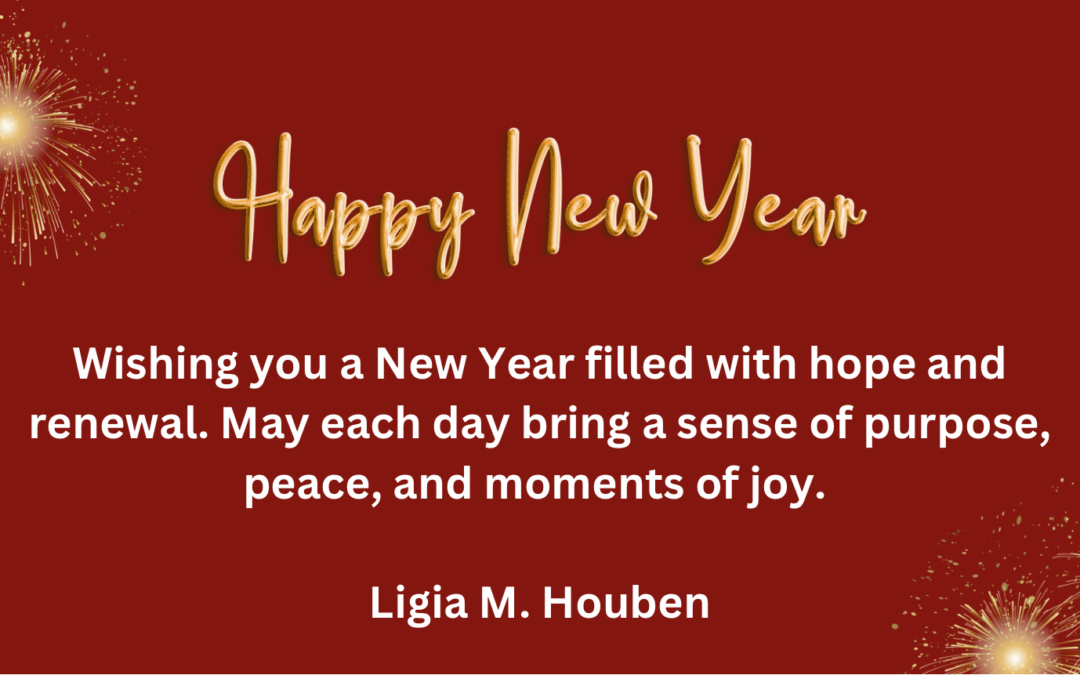
by Ligia Houben | Dec 31, 2023 | Blog US
As we stand at the cusp of a new year, let the wisdom of Søren Kierkegaard inspire us, “Life can only be understood backward; but it must be lived forward,” and reflect together on what this year meant to us. His profound words remind us that understanding our past is crucial to meaningfully living our future. The practice of introspection at the end of the year is a powerful tool for our personal growth and self-awareness.
Reflecting on the Year
Reflection is more than merely glancing at the past; it explores experiences and lessons. Like a mosaic of varied experiences, this year has brought us joys, challenges, and invaluable lessons. As you ponder what the year has brought, what you’ve learned about yourself, and how you’ve lived with purpose, you’re not just recounting events but diving into your experiences’ essence.
Living with Purpose: Did your actions align with your values and goals? Purposeful living often brings a sense of fulfillment and joy.
Expressing Love and Gratitude: Reflect on your relationships and remember that love and gratitude are powerful, enriching our connections and well-being.
Forgiveness and Hope: These are pillars of emotional resilience. Reflecting on these can be transformative, especially when overcoming challenges.
Staying True to Oneself: This is about being honest with ourselves. It is about authenticity. Were there moments when you could not connect with your inner self? What led to them?
Acknowledging Pain and Loss
In life, we have happy moments and sad moments. Acknowledging these feelings and understanding their roots and impacts in our lives is crucial. Processing pain is not just about coping; it’s about growth and healing.
It’s about transformation.
Transforming Challenges: How have your challenges shaped you? What strengths have you discovered in yourself as a result?
Embracing Hope: It is essential to keep hope in our hearts as it propels us forward, especially during uncertainty or distress.
Creating Your 2024
As you visualize 2024, it’s about choice – the choice to be happier, think positively, act with purpose, and live in alignment with your true self. Your approach to the new year is not just about setting goals; it’s about nurturing a mindset that fosters hope, peace, growth, happiness, and fulfillment.
I wish you a blessed New Year!
Ligia M. Houben
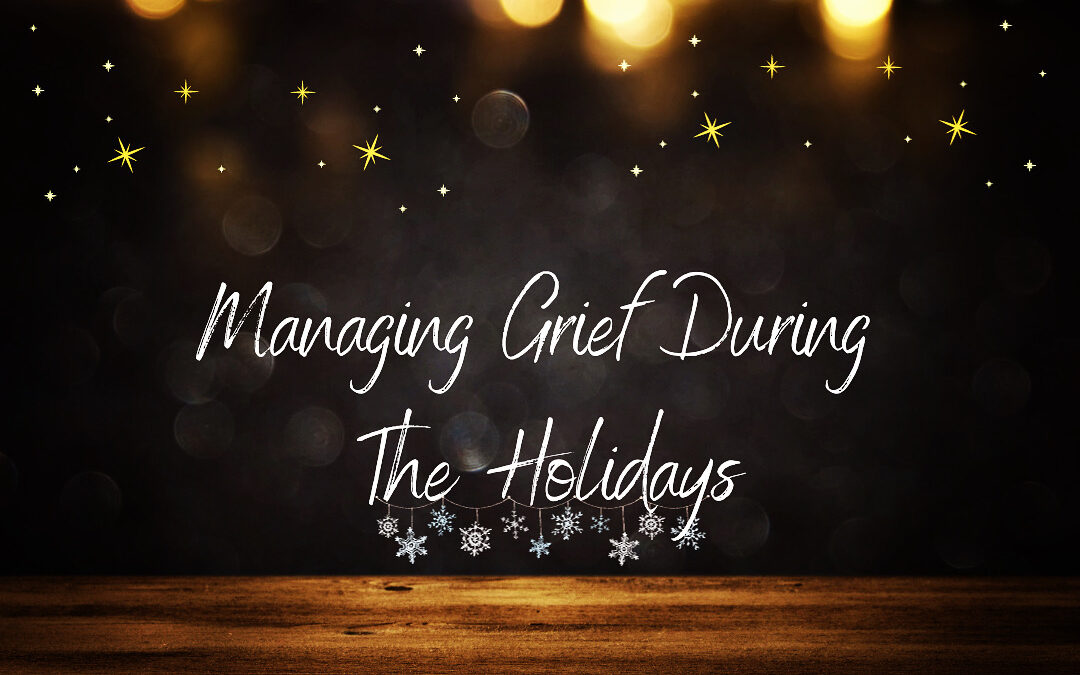
by Ligia Houben | Nov 27, 2023 | Blog US
As we have recently started our Holiday Season with Thanksgiving, it’s a time to gather with loved ones, celebrate, and enjoy. However, for those who have recently lost a loved one, this season may feel empty and challenging. It’s important you recognize and validate your feelings and connect with family and friends.
Coping with Loss During the Holidays
You cannot change what has happened, but you can still find new meaning during these special days. Even if you don’t feel like celebrating, you can remember your loved one in meaningful ways, such as creating rituals.
Creating Rituals
– Light a Candle: Light a candle in remembrance as you gather with your family.
– Share Memories: Sharing special memories can be a powerful way to honor your loved one.
– Memory Chest: Place a chest in the living room where family and friends can share anecdotes.
Starting New Traditions
In many families, a particular person leads the celebrations. Their absence can be deeply felt, but this also opens up the possibility of starting new traditions.
– Elissa’s Story: Elissa, a Lebanese American, celebrates Thanksgiving with a stuffed lamb instead of turkey to honor her Lebanese father.
– Hortensia’s Tradition: Hortensia, from Venezuela, continues her mother’s legacy by cooking pernil de cerdo al horno (oven-roasted pork) every Christmas.
Preparing for the First Celebration Without Your Loved One
The first holiday season without your loved one can be particularly challenging. Preparation and finding meaning in these days are essential.
Dealing with Grief
– Some people might turn to alcohol or drugs, but this is not a healthy coping mechanism.
– Prescription drugs might help some manage grief-related anxiety or depression.
– Spirituality and participating in rituals can offer solace.
– Counseling or griefwork can provide guidance and support.
Validating Different Kinds of Losses
Besides the loss of a loved one, other transitions can affect our holiday joy:
– Job loss, financial difficulties.
– Mental and physical illnesses.
– Loneliness, depression, anxiety.
– Relocating to a new place.
– Family disharmony.
– Relationship breakdowns.
– Loss of a pet.
Communicating Needs and Transforming the Season
Communicate your needs with others, take care of yourself, and consider using this time to grow closer to loved ones or serve others.
– Spend time with children or elderly who might need attention and care.
– Remember, giving from the heart means more than material gifts.
Final Thoughts
Though the holidays can be difficult, they also offer opportunities to share time with special people in your life. By transforming your loss, you can change your life.
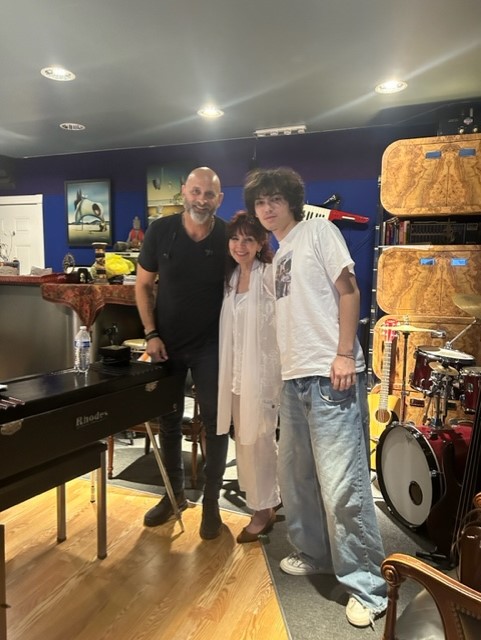
by Ligia Houben | Nov 26, 2023 | blog, Blog US
Introduction
Grief is a journey with unique paths, and it was uniquely challenging for Leonidas Reimer, a young adolescent. Losing Kennedy, his girlfriend, to suicide, Leonidas found himself engulfed in a sea of emotions. However, in the depths of his sorrow, he discovered solace and expression through music. His story is one of healing and transformation, a narrative that resonates with the power of purpose and passion. Although Leonidas’ world turned upside down when he lost Kennedy, he was determined to channel his pain into something meaningful.
The Healing Power of Music
Music became Leonidas’ refuge, and he started working on his album, “Songs for a Long Train Ride Home.” He poured his heart into melodies and lyrics, each note a step towards healing. His songs, raw and honest, are a tribute to Kennedy; they are a way to keep her memory alive.
Because music is his passion, I wanted him to meet Marlow Rosado, an amazing human being and accomplished musician. He is the winner of two Grammys and producer of my upcoming audiobook in Spanish, “Déjame vivir mi duelo…y sanar de adentro hacia afuera” (Allow Me to Grieve…and Heal From the Inside Out). Leonidas visited Marlow’s studio when we were recording, and he had the opportunity to learn from Marlow’s experience and share his story.
In the sanctuary of Marlow’s studio, surrounded by instruments and echoes of creativity, Leonidas shared his album “Songs for a Long Train Ride Home.” Marlow listened to Leonidas’ journey, and with an open heart, he offered more than just musical advice; he provided sensitive insights on healing through purpose. Leonidas’ encounter with Marlow was profound as it confirmed his mission: to use his music as a beacon for others traversing the dark waters of grief. It touches my heart to see how Leonidas has embraced the transformative power of music, demonstrating how it can be a vessel for grief, carrying it from the shadows into the light.
Leonidas’ story is a poignant reminder that a melody of hope can emerge in the depths of despair. Through his music, he honors Kennedy’s memory and offers a guiding light to those who have experienced similar loss. Furthermore, his journey continues after his music. He is also working on a film, “The Kennedy Project,” to introduce a proactive stance to suicide prevention.
Reflection
Grief is a profound and complex emotional response to loss, particularly when we lose someone significant in our lives. Although the process varies significantly from person to person, being witnessed in grief is crucial. What helps the most is to express our emotions in a safe and understanding environment, validating our feelings and experiences. Healing from grief is a gradual process of re-engaging with life, finding new meanings, and living life with a renewed sense of purpose.
As I reflect on Leonidas’ journey, I am confident he will continue showing the resilience and compassion of his human spirit, and his ability to find solace and meaning in creativity.

by Ligia Houben | Oct 30, 2023 | Blog US
Understanding that a divorce is a unique journey, here are some suggestions that can help you move forward in this life transition:
1. Allow Yourself to Grieve
Instead of suppressing your emotions, acknowledge that divorce is a loss and it’s natural to experience grief. Find healthy ways, such as journaling, talking to a close friend, joining a support group, or seeking professional help, to express your feelings and be present with your emotions without judgment.
2. Establish Boundaries and Practice Self-Care
Paying attention to your needs includes setting boundaries if this causes you stress. Take care of your physical, mental, and emotional well-being. This includes eating healthy food, exercising, and practicing relaxation techniques such as conscious breathing, mindfulness, or meditation.
3. Rebuild Your Identity
Because a divorce brings changes, you want to open your heart and mind to take it as an opportunity to discover who you are now. Explore the roles you are letting go of and embrace new ones that promote self-growth and empowerment. This includes setting personal and professional goals, taking care of your finances, and paying attention to the messages you give to yourself.
4. Create a Strong Support System
This can consist of family and friends who are there to support you without judging. The idea is that they can actively listen when you need to share how you feel and encourage you when you think you need to lean on them. Belonging to a divorce support group can also help you navigate this transition.
5. Believe in Yourself and Embrace Change
This is very close to feeling empowered is believing in your capacity to embrace change and become a better version of yourself. Remember, you can do this!
Remember, your life has meaning!
Ligia M. Houben
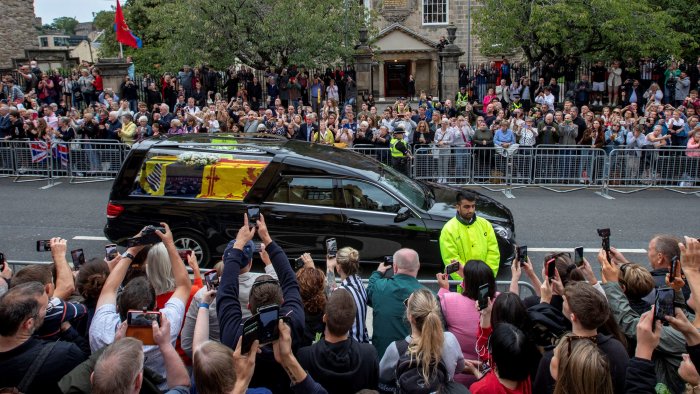
by Ligia Houben | Oct 3, 2022 | Blog US
This past Thursday, September 8, Queen Elizabeth II of England passed away, and for almost two weeks we witnessed one of the greatest rituals witnessed in recent times to honor the life of a person. This was public and collective grief. It represented the end of a 70-year monarchy and was at the same time a transition to something new. After a loss, we know that there is always a change (you can see my message on YouTube about this topic).
The majesty and solemnity of the funeral were something really impressive and brought us to the consciousness of the value of the funeral. Not only, but it also reminded me of the time when I taught a class on death at the University of Florida, and we covered precisely the value of the funeral, which has been considered the greatest ritual.
According to Vanderlyn Pine1 the funeral addresses four main social functions:
1. Serves to recognize and commemorate the death of a person
2. Provides an environment for the disposal of the corpse
3. It helps to reorient the afflicted into their lives, which have been broken by death.
4. It demonstrates reciprocal economic and social obligations between the bereaved and their social world.
The funeral is supposed to have two great qualities: first, we show the world that we are grieving, that we have lost someone special to us; the other is to give the opportunity to the people who accompany us in the process. In the case of Queen Elizabeth II, people have come in an unprecedented way. Among the crowd we have been able to see from the elderly to children who have wanted to be part of history; many came to pay their respects, as a way to honor it.
We have seen all the essential elements of this ritual: the expression of grief, symbolism, tradition, solemnity, and union. Another element that was present was the black clothing. The royal family dressed in black clothes depicting that they are in mourning, a color also worn by the thousands of people who attended the funeral. We have been able to notice that although many people consider mourning to be in disuse, it is something that symbolizes internal pain when expressed externally. In the current times for many people wearing black does not represent anything, however, it is what has been styled as a way of expressing that one is grieving. This custom of wearing black clothes at funerals was institutionalized by the Catholic Monarchs in the sixteenth century. Black was considered the appropriate color for funerals. It was customary for widows to all wear black, including mantle, veil and hat in the times of the Middle Ages and Renaissance.2
In my case black clothes and mourning is part of me because it is a belief established by my mother. What’s more, I took the next paragraph from my book, Let Me Live My Grief… and heal from the inside out:
Black clothing
“And you’re still in black? She wouldn’t want to see you in black.” That phrase was told to me by several people with the best intentions certain months after my mother passed away. On one occasion I replied, “Well, she would like to see me in mourning, because she instilled it in me.” My mom believed in mourning. When my dad died, she kept him three years of stiff mourning. As a twelve-year-old girl, I kept a year of mourning.
Witnessing this majestic funeral also reminded me of how hard it is if we can’t have a funeral. We have lived through a global situation with Covid-19 that prevented us from having a funeral or if we had it, we could not do it the way we wanted. I can identify myself because I lost my mother on June 7, 2020, in the middle of COVID time and I was deprived, like so many other people, to receive the desired hugs and share our grief.
Furthermore, many people choose not to have a funeral, even if they could. It is their choice because they do not believe in such a ritual. However, for those of us who believe in it and appreciate the value it represents, it leaves a void, not being able to carry it out as we had always wanted.
On the other hand, other people avoid going to funerals because they “don’t like it”, being sometimes the only way, we confirm that death has happened. The funeral is a ritual to say the last goodbye, accompanying our loved one to his last abode.
Queen Elizabeth II has been accompanied with much affection, respect, and admiration. At the beginning of our lives, we do rituals celebrating the life of a baby who has been born. When we reach the end of our lives, in the same way the funeral is that ritual to honor and at the same time celebrate our life.
1. DeSpelder, Lynn Ann & Albert Lee Strickland (2005). The Last Dance. Encountering Death and Dying. 7th Edition. McGraw-Hill Publisher: New York, NY
2. https://www.heraldo.es/noticias/sociedad/2019/12/02/por-que-viste-negro-los-funerales-1280957-310.html







